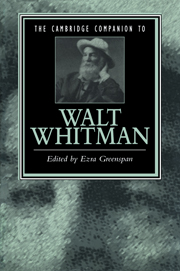Book contents
- Frontmatter
- 1 Introduction
- 2 “As If I Were With You”
- 3 Fratricide and Brotherly Love
- 4 Reading Whitman’s Postwar Poetry
- 5 Politics and Poetry
- 6 Some Remarks on the Poetics of “Participle-Loving Whitman”
- 7 “Being a Woman ... I Wish to Give My Own View”
- 8 Appearing in Print
- 9 “I Sing the Body Electric”
- 10 Walt Whitman
- 11 Borge's "Song of Myself"
- Suggestions for further reading
- Index
- Series List
6 - Some Remarks on the Poetics of “Participle-Loving Whitman”
Published online by Cambridge University Press: 28 May 2006
- Frontmatter
- 1 Introduction
- 2 “As If I Were With You”
- 3 Fratricide and Brotherly Love
- 4 Reading Whitman’s Postwar Poetry
- 5 Politics and Poetry
- 6 Some Remarks on the Poetics of “Participle-Loving Whitman”
- 7 “Being a Woman ... I Wish to Give My Own View”
- 8 Appearing in Print
- 9 “I Sing the Body Electric”
- 10 Walt Whitman
- 11 Borge's "Song of Myself"
- Suggestions for further reading
- Index
- Series List
Summary
I take my title from a stray observation thrown off by Randall Jarrell in the course of his scintillating defense of Whitman's poetics back in the 1950s, when Whitman was generally out of fashion in the New Criticism-dominated days of American literary criticism. Jarrell spoke at the time of “participle-loving Whitman” in the course of his discussion of several of the most distinctive features he found in Whitman's verse. In this essay, I take up Jarrell's observation and expand on it as a way of making several fundamental points about the poetics of Leaves of Grass. In doing so, I hope that I am capturing something of Jarrell's concern for the connection between the spirit of Whitman's poetry and that of the age - whether the age be Whitman's or our own.
The first point I would like to make is perhaps the most basic: Whitman had a lifelong attachment to the grammatical form of the present participle. I can make this point most convincingly, Whitman-style, simply by cataloging. Consider the following list of titles of his poems: “Beginning My Studies,” “The Ship Starting,” “I Hear America Singing,” “Starting from Paumanok,” “Facing West from California's Shores,” “Whoever You Are Holding Me Now in Hand,” “These I Singing in Spring,” “I Saw in Louisiana a Live-Oak Growing,” “We Two Boys Together Clinging,” “Crossing Brooklyn Ferry,” “A Song of the Rolling Earth,” “Out of the Cradle Endlessly Rocking,” “Roaming in Thought,” “Cavalry Crossing a Ford,” “Ethiopia Saluting the Colors,” “Chanting the Square Deific,” “Pensive on Her Dead Gazing,” “'Going Somewhere.'” These poems come from all periods of his long career and encompass all the modes of verse in which he wrote.
- Type
- Chapter
- Information
- The Cambridge Companion to Walt Whitman , pp. 92 - 109Publisher: Cambridge University PressPrint publication year: 1995
- 2
- Cited by

